Drew Myron's Blog, page 4
March 20, 2025
Thankful Thursday: One Good Line
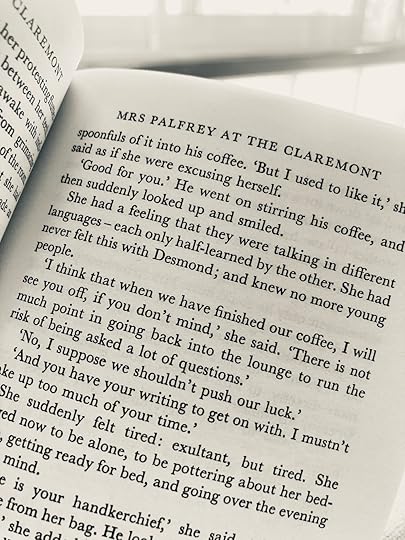
It’s Thankful Thursday, a weekly pause to express appreciation for people, places, things, and more. Whether puny or profound, attention attracts gratitude and gratitude expands joy. Please join me.
Some days I need a great deal to dig out of life’s debris — a vacation, say, or a windfall of some sort. Other days it takes very little to shift the mind and lift the heart.
I’ve taken to collecting small moments: a warm glove, a soft shirt, a beat of sunlight across the floor. This week, a novel calmed and this line called:
She had a feeling that they were
talking in different languages —
each only half-learned by the other.
— from Mrs Palfrey at the Claremont
This 1971 novel was written by Elizabeth Taylor (not that Elizabeth but this Elizabeth). In 2005, the book was made into a movie, starring Joan Plowright and Rupert Friend. I saw the movie years ago, and just recently read the book. Both, I’m pleased to report, are warm and loving.
And really, lately, and maybe always, warm and loving is all I need.
What are you thankful for today?
* * *
The world turns on words. Thank you for reading & writing.
• If you know someone who might enjoy this blog — please share.
• If you want to read more — subscribe for free.
• If you are here, reading this now — thank you!
March 9, 2025
On Sunday: Stillness
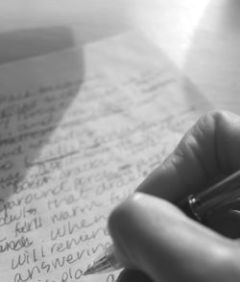
Whale Song
Humpback whales sing the way humans speak
— The New York Times
1.
Today my horoscope gives a warning:
“If there is an ambulance in your relationship . . . ”
Yes, yes, I nod. I hear the siren, feel the clutch
of worry and pitched frequency of fear as
the alarm races toward me.
But when I blink and read again, the emergency is over:
“If there is an imbalance . . . ” it says.
2.
For many days you are sick.
Your head fogs, your throat closes,
and I do the talking, too much, because
worry grips my heart and
triggers a babble.
3.
We know now that marriage
is a language of the mundane
passed through generations:
“How was your day?”
“What’s for dinner?”
“Do you wanna watch tv?”
We are efficient — this, that, small words that return and repeat.
We slice our energetic costs, find savings we don’t need.
4.
Sometimes we talk softly, gently
because silence is a bridge and
we want to meet in the middle.
5.
Sometimes we don’t talk because there is too much to say.
6.
Tonight before the song,
in the stillness between us,
we look deeper, listen longer,
find each other in the hum.
— Drew Myron
* * *
The world turns on words. Thank you for reading & writing.
• If you know someone who might enjoy this blog — please share.
• If you want to read more — subscribe for free.
• If you are here, reading this now — thank you!
February 27, 2025
Fast Five with Luisa A. Igloria
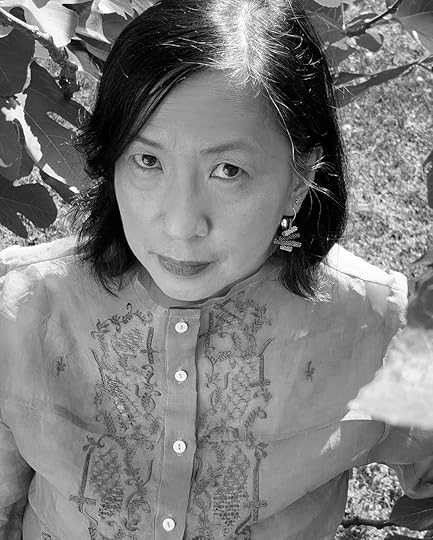
Photo by Gabriela Igloria
“The language of poetry is what I like to turn to, in order to process the information life / the world throws at me.”— Luisa A. Igloria
Welcome to Fast Five, an occasional series in which I ask my favorite writers five questions as a way to open the door to know more.
Luisa A. Igloria is the author of 14 books of poetry, four chapbooks, and editor of three anthologies. From 2020 to 2022, she served as Poet Laureate of the Commonwealth of Virginia.
Originally from Baguio City, Philippines, Luisa lives in Norfolk, Virginia, where she is a professor of English and Creative Writing at Old Dominion University.
She has been lauded with numerous awards for her work, including the world’s first major award for eco-poetry, and a lifetime achievement award from the Writers Union of the Philippines.
Despite the many accolades and achievements, it was a quiet corner of the internet where I first found her work. Every day for 14 years, Luisa has written and shared a poem at Via Negativa.
1.
Why write?
I can’t think of a good reason not to. Perhaps this is because I was raised in a book-reading, book-loving family, and developed an early appreciation for language. I recall my late father telling me that we may not have been wealthy, but he would see to it that I got a good education. Also, I’m more of an introvert, and it just seemed natural that I’d be attracted to things that could be done in solitude (reading, writing, making art, playing music).
For the last 14 years + 3 months (and running), I’ve kept a daily writing practice (in which I write at least a poem a day). This has taught me a lot about myself as a writer— and I’ve come to realize that the language of poetry is what I like to turn to, in order to process the information life/the world throws at me.
2.
You have a full and prolific professional life. What do you enjoy about writing, teaching, leading?
I love the way my practice as a poet and as a teacher (of poetry, creative nonfiction, and literature) engages language which has the capacity to immediately and deeply address the human in us. The language of poetry, of art in general, isn’t merely transactional. It allows us to access the beauty as well as vulnerability of human experience, and in so doing, feel connected to ourselves and to others.
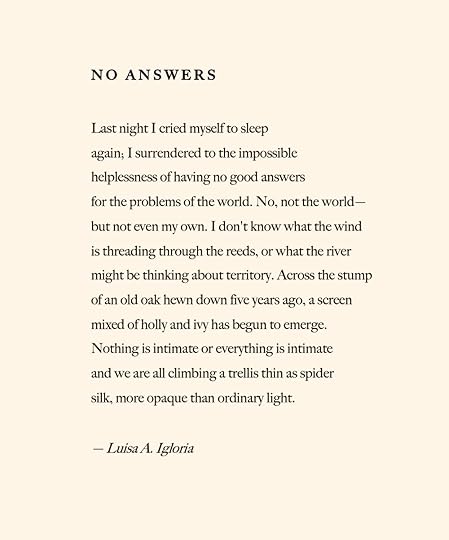
From Via Negativa, where Luisa A. Igloria posts fresh poems daily.
3.
What’s the best — or worst — writing advice you’ve received?
Perhaps one of the worst kinds of writing advice: Write (only) what you know.
One of the best kinds of writing advice: It’s ok to write into what you don’t (yet) know. That’s how discovery happens; how else could you get to wonder, except by admitting there are so many mysteries in the world that still have the capacity to floor you?
4.
What book do you return to again and again?
I love Federico García Lorca’s In Search of Duende — for his reminder that creativity is more than technical or mechanical mastery of skills. His theory of the duende taps into the importance of also cultivating a connection to more ineffable, intuitive, perhaps even archetypal energies. In other words, anyone can learn to be a good carpenter of language; but learning to make language sing is a different matter.
Another book that is formative and important to me is Magnificence and Other Stories by the Filipina writer Estrella D. Alfon (1960).
5.
What are you currently working on?
A new manuscript on the creation of a hill station in the northern part of the Philippines (where I am from) by the American colonial government, in the 1900s. History continues to fascinate me, as an archive full of narratives that could take on a different sheen depending on the point of view of their telling. Also, from this perspective, the past is not necessarily “over.”
Bonus Question: I'm a word collector, and keeping a running list of favorites? What are yours?
Some favorites:
pine cypress mountain archipelago
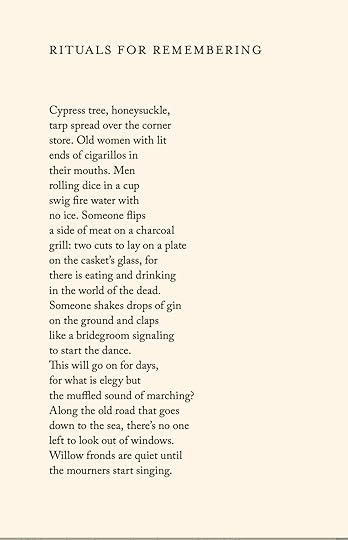
February 20, 2025
Thankful Thursday: Want
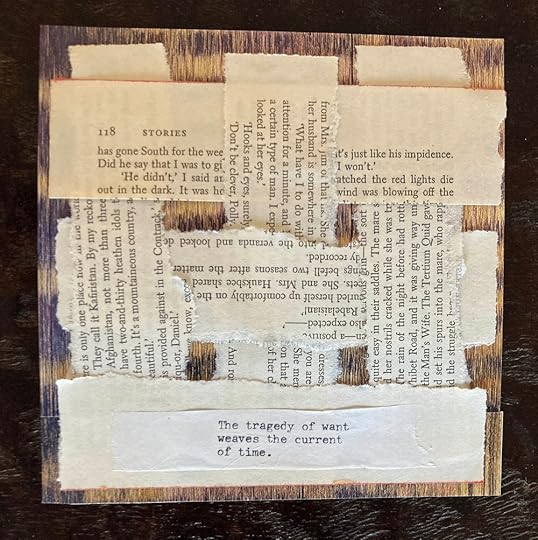
Of Want, visual poem by Drew Myron
It’s Thankful Thursday, a weekly pause to express appreciation for people, places, things, and more. Attention attracts gratitude, and gratitude expands joy. Please join me.
For years I've believed wholly, deeply, not-quite-religiously in the power of positive thinking. What you focus on becomes. What you resist, persists. I really do believe that gratitude is a powerful way to pivot from despair to repair to release to rejoice.
Sounds corny, I know.
But the weekly pause for gratitude helps to counter my small self and petty complaints, along with all the big world aches that crush the spirit. Lately, however, the big and small overwhelm my ability to “find the good.”
In the weary season, I am reminded of Sarah Cord’s description of gratitude:
“To be grateful is to live a full life. It is to know worry and accept worry. It is to shore up the foundations even in the face of the weathering forces of tragedies and time.”
For years, I’ve met you here on a weekly basis and often encouraged you to join me in Thankful Thursday. Just as love is a verb, thankfulness works best when it moves in action and awareness. In giving thanks, either privately or publicly, in solitude or community, the point is not to count your riches / blessings / advantages but to exercise the muscle that strengthens appreciation.
Gratitude is a practice, just as paying attention is a practice. The more you see, the deeper you look, and, in turn, the more you see.
When I feel waves of want — the crushing desire for more time, money, skill, ability, or a better world — practicing gratitude offers a valuable perspective shift. You train your eyes, and your heart, to “see the good.” And soon the exercise feels less a chore and more a pleasure. In this shift, want is the window that lets gratitude in.
What are you thankful for today?
* * *
The world turns on words. Thank you for reading & writing.
• If you know someone who might enjoy this blog — please share.
• If you want to read more — subscribe for free.
• If you are here, reading this now — thank you!
February 14, 2025
Love & Other Verbs
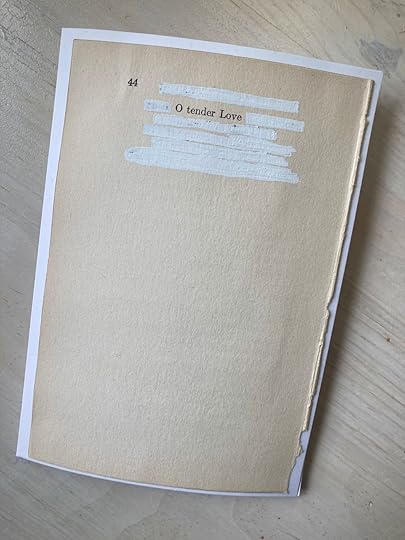
Tender, an erasure poem by Drew Myron
O Tender Love
I want
a song
with a
tether of
sound
that
carries
all that
fails us
with a string
that gives
flight
and
lifts us
to the quiet
field of
wonder
we forgot
we had
lost
— Drew Myron
Three words, scratched, can make a poem.
On this day, will you please join me in large & small appreciations:
make something, say something, love something.
xox
February 7, 2025
Got a Good Line?
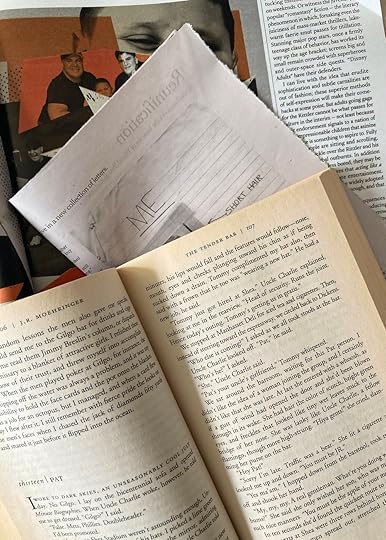
Magazines, books, signposts, poems — among the avalanche of words I’m always looking for one good line. A strong passage, an unexpected turn, a moment that lifts and holds. That’s the sign of a good time.
This week, I’ve been lucky to catch a few:
His words make a little corkscrew of sorrow twist inside you.
— by Dwight Garner in the The New York Times Book Review on Love, Joe: The Selected Letters of Joe Brainard [ Joe Brainard is author of the seminal stream-of-consciousness poetic memoir, I Remember, published in 1970 ]
At last she entered with a whoosh, as if a gust of wind had opened the door and she’d been blown through in its wake. She had hair the color of scotch, bright green eyes. and freckles that looked like tiny wet leaves stuck to the bridge of her nose.
— from The Tender Bar, a memoir by J.R. Moehringer
I don’t know what to do with old photographs anymore.
— from Congratulating Your Photograph On Your Move to London, a poem by Kami Enzie, appearing in Poet Lore, Volume 118. [ This poem excerpt served as a great writing prompt for me this week. Really, what do we do with old photographs? ]
We trawl the dopamine deserts of the same social media apps, looking for loud noises and bright colors to punctuate the malaise. We have near-unlimited access to information and somehow fail to be curious about any of it.
— from Grow Up, an essay by Helen Holmes, published in The New York Times Magazine
Your turn: Have you read (or written) a good line lately? Please share with me.
Stay curious & keep on.
* * *
The world turns on words. Thank you for reading & writing.
• If you know someone who might enjoy this blog — please share.
• If you want to read more — subscribe for free.
• If you are here, reading this now — thank you!
February 1, 2025
Scratch & Swirl
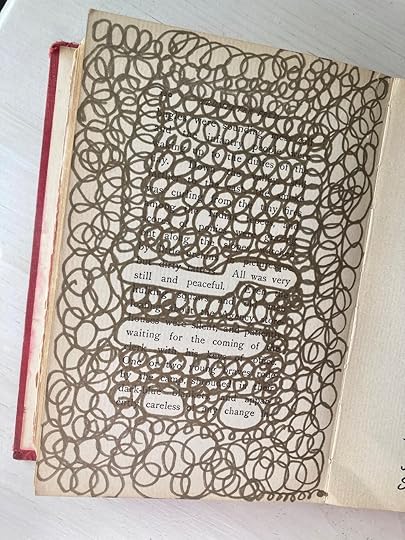
Careless, an erasure poem by Drew Myron
It’s been a week.
What can we do — cling and wait, fret and furrow?
Knowledge may be power, and ignorance bliss, but silence is not golden. Indignation spends energy but does not make change. What do we do in the middle ground, in the mid-day, in the rumble of chaos?
I scratch and swirl. It’s not much. It’s something. It’s nothing. It’s this.
What are you doing?
January 28, 2025
Two for Tuesday
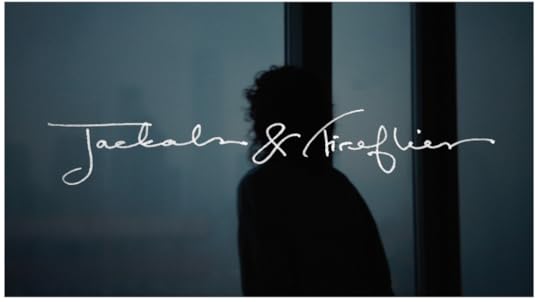
Hello Readers, Writers, Friends:
The days move quickly. Life feels full as everything swells, brims, bubbles, spills.
Or maybe it’s just me?
In the pause, I find small gems. On this Two for Tuesday, I offer you:
1.
Jackals & Fireflies — a short film written by poet Eva H.D. and directed by filmmaker Charlie Kaufman.This 20-minute film delivers a haunting and hypnotic blend of writing, image, music and mood.
Kaufman is the writer/director behind some of this era’s more trippy and thought-provoking films (and many of my favorites): I’m Thinking of Ending Things, Adaptation, and Eternal Sunshine of the Spotless Mind.
Eva H.D. is a writer I first found through Bonedog, a poem that was featured in Kaufman’s film, I’m Thinking of Ending Things. The piece was so movingI raced to learn more about the poem and the poet. (I raved about her here). She has several books, frequently collaborates with Kaufman, and describes Jackals & Fireflies as a “book disguised as a film.”
2.
His Three Daughters - Just when I think I’m done with grief, a powerful film comes along to gut punch me to catharsis.
This 2024 drama follows three sisters as they deal with the death of their father. With taut performances by Carrie Coon, Natasha Lyonne, and Elizabeth Olsen, this film is close and tight and so very real. If you’ve been near someone at the end of life, in this movie you’ll likely see yourself (and cringe), your siblings (and groan), and all the broken complicated feelings of love and loss.
Do you know this movie? It’s quiet and tense and I stumbled on it by mistake (or by a Netflix algorithm). I don’t usually watch first-run films, so maybe this one is a big hit and I’ve been in the dark? Either way, it’s my latest favorite film.
How about you? What are you reading, seeing, watching, feeling? I always enjoy hearing from you. Send light — write!
January 17, 2025
Dear You

Bless You, a visual poem by Drew Myron.
Dear You (and you and you) —
Now the rain has wore me down, and I'm slipping into sweets and drink and other gluttonies.
To lift the spirits, I turn to poems and find a good one that urges readers to make art from everyday experience, and I raise my hand in praise, yes, this.
I told myself I would write a poem in response to that poem, but here I am, sitting in half-light, watching darkness gather and cold collect and I am not writing a poem. I am writing to you, which is much the same but without profound pause and studied punctuation.
Who knows, really, how this all works?
Some days the hush is deep and you swan through worries. But more often, the chaos swirls and you search for branch, dock, pen, paper, a landing.
You are writing in the dark. A phrase arrives that is not your own, that you do not understand, that you can never know until the words stir and settle and say everything you cannot.
I am writing to self, to sky, to the way gray sucks up light and leaves us cold and lonely, without victory or vices. I am waving, dimly, a shrug of a gesture really, across a distance in which only you can see.
With love,
Drew
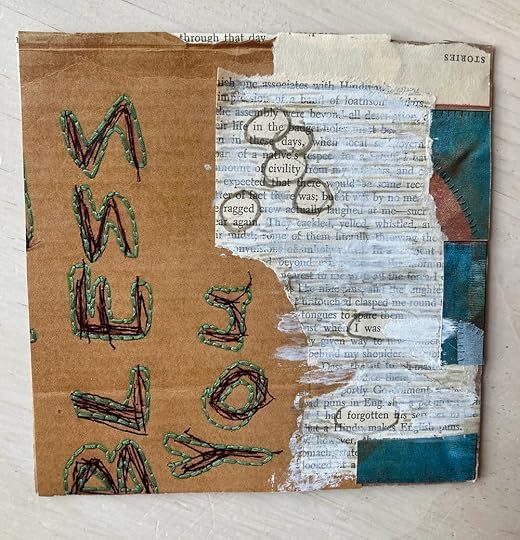
* * *
The world turns on words. Thank you for reading & writing.
• If you know someone who might enjoy this blog — please share.
• If you want to read more — subscribe for free.
• If you are here, reading this now — thank you!
January 7, 2025
Gnaw & Thrall
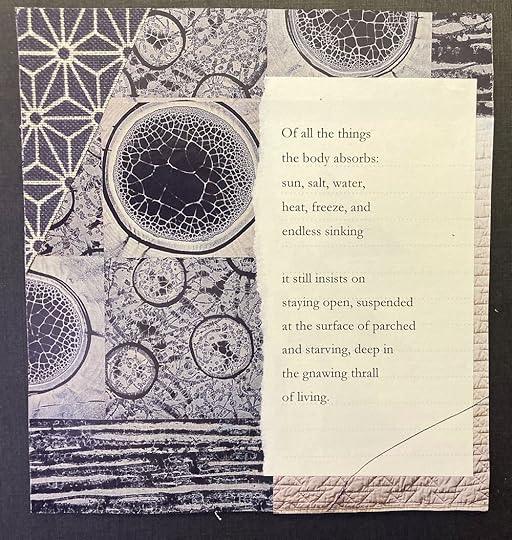
Gnaw & Thrall, a visual poem by Drew Myron
Gnaw & Thrall
Of all the things
the body absorbs:
sun, salt, water,
heat, freeze, and
endless sinking
it still insists on
staying open, suspended
at the surface of parched
and starving, deep in
the gnawing thrall
of living.
— Drew Myron
* * *
The world turns on words.
What are you reading, writing, making?



